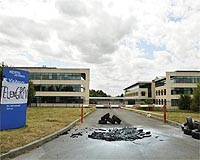| . |  |
. |
Sanaa, Yemen (UPI) Jul 20, 2009 Yemen, one of the poorest of the Arab states but strategically located between the Red Sea and the Gulf, is facing mounting security problems on several fronts, underlining concern that it's becoming a springboard for a renewed al-Qaida offensive in Saudi Arabia and the Horn Of Africa. The Saudi and Yemeni branches of al-Qaida were united in January to form al-Qaida in the Arabian Peninsula under the leadership of Nasser al-Wahaishi, a Yemeni associated with Osama bin Laden. The Saudis crushed a four-year al-Qaeda insurgency in 2007-08, and now Yemen has become the organization's new base in the Gulf region. Security officials in Sanaa say that scores of al-Qaida operatives fled Saudi Arabia and rebased in Yemen. They are believed to have been reinforced by jihadists who fled Afghanistan and Pakistan. This has fueled concerns that Yemen, or possibly war-ravaged Somalia across the Red Sea, will become new sanctuaries for jihadists fleeing the Pakistani army's offensives. The Saudis are so concerned at al-Qaida's resurgence in Yemen they have set aside their traditional deep distrust of their southern neighbor, the most populous state on the Arabian peninsula, and pushed intelligence collaboration between Riyadh and Sanaa to unprecedented levels. King Abdallah of Saudi Arabia handed cash-strapped Yemeni President Ali Abdullah Saleh several hundred million dollars to finance efforts by Yemen's security services to seal their porous common border. The kingdom's primary intelligence services, the General Intelligence Directorate, headed by Prince Muqrin bin Abdelaziz, and the General Security Service, led by Prince Nayef bin Abdulaziz, are scheduled to send senior officers to Sanaa to supervise this joint operation and establish a Saudi intelligence bureau in Yemen. If claims by the National Security Agency, one of Yemen's two main intelligence organizations, are to be believed, this new cooperation has already paid off. The NSA, which is commanded by Ammar Saleh, a relative of the Yemeni president, announced on June 14 that two days earlier it had arrested a Saudi named Hassan bin Hussein Alwan in Marib province in eastern Yemen. They identified him as the leading financier of al-Qaida in Yemen and Saudi Arabia and one of those who had fled Pakistan's war-torn Waziristan region. The Yemenis said his capture was expected to lead to the arrest of other senior jihadist figures. Such pronouncements by Yemeni intelligence, believed to be heavily penetrated by the jihadists, have proved in the past to be exaggerated and wildly optimistic, and intended to placate U.S. critics who accuse Yemen of not doing enough to combat terrorism. There is some doubt that Alwan is actually a Saudi. He was not on Saudi or Yemeni most-wanted lists. Unusually, the Saudis have made no comment on the Yemeni claim, casting further doubt on its veracity. The issue also underlines the rivalry between the NSA and the Political Security Organization, the other main Yemeni intelligence service that Western intelligence officials say is riddled with al-Qaida sympathizers. That allegation was given great substance in February 2006, when 23 hardcore jihadists, led by al-Wahaishi, tunneled their way out of the PSO's high-security prison in Sanaa. They are believed to have been aided by PSO officials. These rivalries are likely to weaken any expectation that the Sanaa government has the political will to mount an all-out offensive against the jihadists. In the past, Saleh's government, heavily dependent on the support of Islamist tribal leaders, has been reluctant to do that so long as al-Qaida did not get too strong or aggressive, and did not bring its leadership into Yemen. Although circumstances may have changed, Saleh's reluctance to move against al-Qaida has been enhanced because he faces a multitude of other security challenges and a declining economy. A five-year-old rebellion by Shiite tribesmen in northern Yemen continues unabated and has even extended to areas close to the capital. Saudi Arabia, concerned that Iran may be backing the rebels, has provided funds for Yemen's Interior Ministry to buy weapons to counter an upsurge in rebel attacks. The state is being further weakened, and fears of wider regional instability heightened, by mounting friction between the conservative, Islamist northerners and the socialists of the south who once had their own Soviet-backed state and now want it reinstated. Share This Article With Planet Earth
Related Links The Long War - Doctrine and Application
 Walker's World: Explosive militancy
Walker's World: Explosive militancyBordeaux, France (UPI) Jul 20, 2009 There are three striking features about the sudden spate of threats by redundant workers in France to blow up their factories, not including the careful way that police and firefighters have been told not to intervene. The first is that the explosive tactic has now been shown to succeed. Employees at JLG, a company that makes crane-mounted hydraulic platforms that help technicians work ... read more |
|
| The content herein, unless otherwise known to be public domain, are Copyright 1995-2009 - SpaceDaily. AFP and UPI Wire Stories are copyright Agence France-Presse and United Press International. ESA Portal Reports are copyright European Space Agency. All NASA sourced material is public domain. Additional copyrights may apply in whole or part to other bona fide parties. Advertising does not imply endorsement,agreement or approval of any opinions, statements or information provided by SpaceDaily on any Web page published or hosted by SpaceDaily. Privacy Statement |